黄冈专用八年级英语上册Unit2Howoftendoyouexercise第6课时课件新版人教新目标
英语八年级上册Unit2how-often-do-you-exercis

Notes
本课时我们学习的主要语法点是由 what 和 how 引导的特殊疑问句以及对应的答语。 如: What do/does …?
How often do/does …? 等。 What do you usually do on weekends? 你通常周末做什么? I usually listen to music. 我通常听音乐。
Exercise three times a week
A: How often do you exercise? B: Three times a week.
HOW OFTEN DOES HE/SHE DO THESE ACTIVITIES?
.
watch TV
twice a week
A: How often d twice a week
How often every day once a week twice a week three times a week once a month twice a month
※:对频率副词提问,应该用哪个特殊疑问词呢?
every day
once a week twice a week
How often
twice a month, three times a month, three or four times a month 等。
• 典型例题解析
“How often do you exercise?” “I often exercise every day.” “你(你们)多久锻炼一次身体?”“我通常每天 都锻炼。”
………
ORAL PRACTICE
• How often do you do those activities? Make conversations with your partner.
人教新目标版英语八上Unit2《Howoftendoyouexercise》(Period1)说课稿

人教新目标版英语八上Unit 2《How often do you exercise》(Period 1)说课稿一. 教材分析人教新目标版英语八上Unit 2《How often do you exercise》(Period 1)的主要内容是围绕频率副词和一般现在时进行学习和交流。
本节课的主要目的是让学生能够熟练运用频率副词和一般现在时进行日常交流,同时提高他们的听说读写能力。
本节课的主要内容包括三个部分:课文阅读,听力练习和口语练习。
课文阅读部分主要介绍了频率副词和一般现在时的基本用法,听力练习部分通过听对话来提高学生的听力理解能力,口语练习部分通过角色扮演和小组讨论来提高学生的口语表达能力。
二. 学情分析根据我对所教班级学生的了解,他们的英语水平普遍较好,对于频率副词和一般现在时的基本用法已经有了一定的了解。
但是,他们在口语表达和听力理解方面还存在一些问题。
因此,在教学过程中,我需要注重培养他们的口语表达能力和听力理解能力。
三. 说教学目标根据教材内容和学情分析,本节课的教学目标如下:1.能够熟练运用频率副词和一般现在时进行日常交流。
2.提高学生的听说读写能力,尤其是口语表达能力和听力理解能力。
3.培养学生的团队合作意识和跨文化交际能力。
四. 说教学重难点本节课的教学重难点如下:1.频率副词的运用。
2.一般现在时的构成和用法。
3.听力理解能力的提高。
4.口语表达能力的培养。
五. 说教学方法与手段为了达到本节课的教学目标,我采用了以下教学方法和手段:1.任务型教学法:通过设计各种任务,让学生在实践中学习和运用语言。
2.交际法:通过模拟真实场景,让学生在交流中学习和提高语言能力。
3.听力教学法:通过听力练习,提高学生的听力理解能力。
4.信息技术辅助教学:利用多媒体课件和网络资源,提高课堂教学效果。
六. 说教学过程本节课的教学过程分为以下几个环节:1.导入:通过播放一段关于运动的视频,引起学生的兴趣,并导入本节课的主题。
八年级英语上册 Unit 2 How often do you exercise(第3课时)教案 (
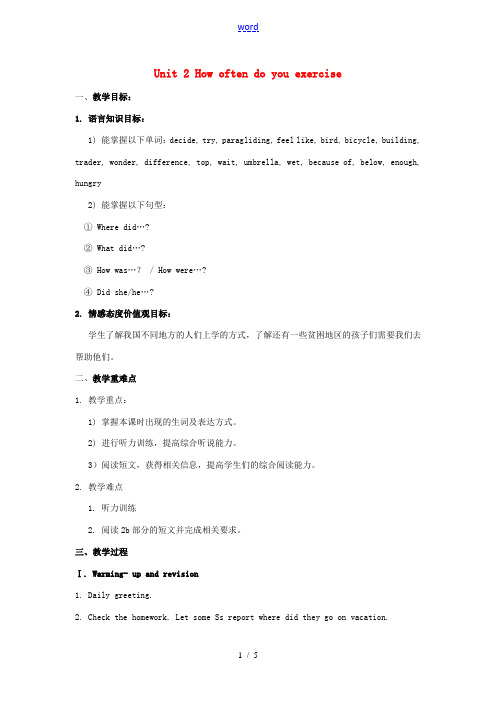
Unit 2 How often do you exercise一、教学目标:1. 语言知识目标:1) 能掌握以下单词:decide, try, paragliding, feel like, bird, bicycle, building, trader, wonder, difference, top, wait, umbrella, wet, because of, below, enough, hungry2) 能掌握以下句型:① Where did…?② What did…?③ How was…? / How were…?④ Did she/he…?2. 情感态度价值观目标:学生了解我国不同地方的人们上学的方式,了解还有一些贫困地区的孩子们需要我们去帮助他们。
二、教学重难点1. 教学重点:1) 掌握本课时出现的生词及表达方式。
2) 进行听力训练,提高综合听说能力。
3)阅读短文,获得相关信息,提高学生们的综合阅读能力。
2. 教学难点1. 听力训练2. 阅读2b部分的短文并完成相关要求。
三、教学过程Ⅰ. Warming- up and revision1. Daily greeting.2. Check the homework. Let some Ss report where did they go on vacation.3. Review the “复合不定代词”4. Review the “反身代词”5. Show a movie of paragliding.Ⅱ. WritingWork on 1a:1. Point to the six words. delicious, expensive, exciting, cheap, terrible, boring2. Read the words and let Ss read after the teacher.3. Point to the last picture and say: This is a cake. It’s delicious. Then do the same thing for all six pictures.4. Let Ss match each word with a picture. Then check the answers with the students. …Work on 1b:1. Explain the meaning of “☺words” and “☹ words.”2. Let Ss discuss the words they know and write them down on the line.3. Let some Ss read out their words to the class. (Or let some Ss write their words on the blackboards.)Ⅲ. ListeningWork on 1c:1. T: Now let's work on 1c. First, let one student read the questions aloud. Make sure all the Ss know the meanings of the questions.2. Play the recording for the first time. Ss only listen.3. Then play the recording for the second time. Ss listen and answer the questions.4. Then play the recording for the third time for the Ss to check the answers.5. Ss listen to the tape and circle the words and phrases they hear.6. Check the answers: (Look at the big screen.)Work on 1d:1. Tell Ss this time they have to write down what Lisa said about her vacation, thepeople, the fun park, the food and the store.2. Then play the recording for the second time. Ss listen and write down the words.3. Then play the recording for the third time for the Ss to check the answers. 听力指导:在听时要抓重点内容。
八年级上英语unit2How often do you exercise短语知识点详解

Unit2 How often do you exercise?本单元的话题:谈论生活习惯,复习一般现在时。
本单元的语法:1.复习一般现在时;2.学习表示频率副词的用法。
主要频率副词的等级排序:always(总是) > usually (通常) > often(经常) > sometimes(有时) > hardly ever(很少) > never(从不) 这些副词在句子中的位置,一般放在助动词、be动词或情态动词之后,行为动词之前。
即:“行”前“助(系)”后。
如:Peter is always late for school. Peter上学总是迟到。
I usually do my homework in the evening. 我通常在晚上做作业。
提问always, sometimes, twice a day 等频率副词,用How oftenI watch TV every day.我每天都看电视→How often do you watch TV?(你多长时间看一次电视?) 重点短语1.such as例如;诸如2.junk food n.垃圾食品;无营养食品3.more than超过;多于;不仅仅;非常4.less than不到;少于5.help with housework 帮助做家务6.on weekends 在周末7.how often 多久一次8.hardly ever 几乎从不9.once a week 每周一次10.twice a month 每月两次11.every day 每天12.be free 有空13.go to the movies 去看电影e the Internet 用互联网15.swing dance 摇摆舞16.play tennis 打网球17.stay up late 熬夜;睡得很晚18.at least 至少19.have dance and piano lessons 上舞蹈课和钢琴课20.go to bed early 早点睡觉21.play sports 进行体育活动22.be good for 对……有好处23.go camping 去野营24.not…at all 一点儿也不……25.in one’s free time 在某人的业余时间26.the most popular 最受欢迎的27.such as 比如;诸如28.old habits die hard 积习难改29.go to the dentist 去看牙医30.morn than 多于;超过31.less than 少于32.help sb. with sth. 帮助某人做某事33.How about…? ......怎么样?34.want sb. to do sth. 想让某人做某事35.How many+可数名词复数+一般疑问句?……有多少……?36.spend time with sb. 和某人一起度过时光37.It’s+ adj.+ to do sth. 做某事的……的。
八年级上 Unit_2_How_often_do_you_exercise_Section_A

always>usually>often>sometimes >hardly ever(几乎没有) >never play soccer after school
mak nnc !
He often plays soccer after school.
always>usually>often>sometimes >hardly ever(几乎没有) >never go skateboarding after school He sometimes goes skateboarding after school.
mak nnc !
always>usually>often>sometimes >hardly ever(几乎没有) >never
mak nnc !
She usually swims after school.
swim after school
a month September
I surf the Internet… four times a month.
Work in pairs.
A: How often do you …? B: Once a week/ Every day / Twice a month /Hardly ever / Never / Sometimes/…
A: How often do you …? TV? watch B: II… watch TV every day.n.节目 Healthy Living A: What’s your favorite program? B: It’s Animal World. … A: How often do you watch it? English Today B: Once a week. …
八年级英语上册Unit-2-How-often-do-you-exercise知识点归纳

八年级英语上册Unit 2 How often do you exercise知识点归纳八年级英语上册Unit 2 How often do you exercise知识点归纳一、词组、短语:1、help with housework 帮助做家务活,2、go shopping 购物,3、on weekends 在周末,4、how often 多久一次,5、hardly ever几乎不,6、once a week 每周一次,7、twice a month每月二次,8、go to the movies去看电影,9、every day 每天,10、use the Internet上网/用网,11、be free有空,12、have dance and piano lessons 上舞蹈钢琴课,13、swing dance摇摆舞14、play tennis 打网球,15、stay up late熬夜,16、at least至少,17、go to bed early 早睡,18、 play sports 锻炼身体,19、be good for 对…有好处,20、go camping去野营,21、in one’s free time 在某人的空闲时间,22、not….at all 根本不,23、the most popular 最流行,24、such as例如,25、go to the dentist去看牙医,26、more than 超过/多于,27、Old habits die hard.旧习惯难改。
28、 hard=difficult 困难的,29、less than 少于/不到二、重要句子(语法):What do you usually do on weekends你周末通常做什么 I always exercise.总是锻炼身体。
What do they do on weekends他们周末干什么 They often help with housework.他们经常帮助干家务活。
人教版八年级上册英语Unit2How often do you exercise知识点
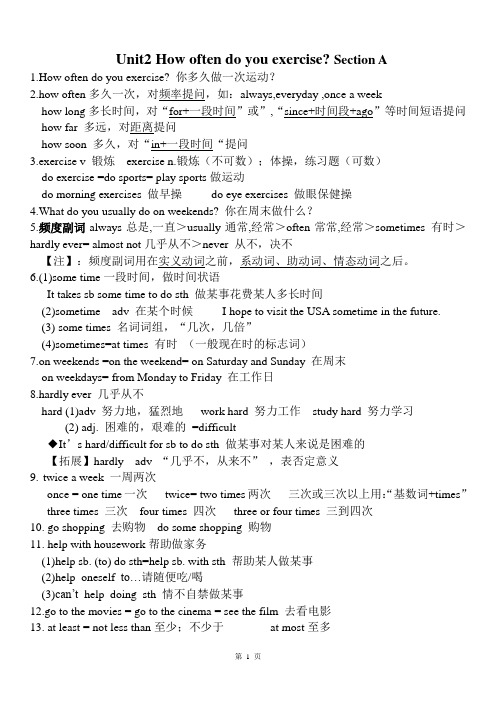
Unit2 How often do you exercise? Section A1.How often do you exercise? 你多久做一次运动?2.how often多久一次,对频率提问,如:always,everyday ,once a weekhow long多长时间,对“for+一段时间”或”,“since+时间段+ago”等时间短语提问how far 多远,对距离提问how soon 多久,对“in+一段时间“提问3.exercise v 锻炼exercise n.锻炼(不可数);体操,练习题(可数)do exercise =do sports= play sports做运动do morning exercises 做早操do eye exercises 做眼保健操4.What do you usually do on weekends? 你在周末做什么?5.频度副词always总是,一直>usually通常,经常>often常常,经常>sometimes 有时>hardly ever= almost not几乎从不>never 从不,决不【注】:频度副词用在实义动词之前,系动词、助动词、情态动词之后。
6.(1)some time一段时间,做时间状语It takes sb some time to do sth 做某事花费某人多长时间(2)sometime adv 在某个时候I hope to visit the USA sometime in the future.(3) some times 名词词组,“几次,几倍”(4)sometimes=at times 有时(一般现在时的标志词)7.on weekends =on the weekend= on Saturday and Sunday 在周末on weekdays= from Monday to Friday 在工作日8.hardly ever 几乎从不hard (1)adv 努力地,猛烈地work hard 努力工作study hard 努力学习(2) adj. 困难的,艰难的=difficult◆It’s hard/difficult for sb to do sth 做某事对某人来说是困难的【拓展】hardly adv “几乎不,从来不”,表否定意义9.twice a week 一周两次once = one time一次twice= two times两次三次或三次以上用:“基数词+times”three times 三次four times 四次three or four times 三到四次10.go shopping 去购物do some shopping 购物11.help with housework帮助做家务(1)help sb. (to) do sth=help sb. with sth 帮助某人做某事(2)help oneself to…请随便吃/喝(3)can’t help doing sth 情不自禁做某事12.go to the movies = go to the cinema = see the film 去看电影13. at least = not less than至少;不少于at most至多14. use the Internet 上网15.What’s your favorite program?=What program do you like best?你最喜欢的节目是什么?16.every day 每天= each day 做状语,放在句末,对其提问用how ofteneveryday = daily adj. 每天的,作定语,修饰名词,放在名词之前He exercises every day. 他每天都锻炼。
八年级英语上册 Unit 2 How often do you exercise(第2课时)教学设计

八年级英语上册 Unit 2 How often do you exercise(第2课时)教学设计一. 教材分析本课时的教材是八年级英语上册Unit 2 How often do you exercise,主要讲述了频率副词的用法以及日常的锻炼活动。
本节课主要通过一个关于日常锻炼的对话来引导学生运用频率副词进行问答。
通过本节课的学习,学生能够掌握频率副词的用法,并能用英语询问和描述他人在日常生活中的锻炼习惯。
二. 学情分析学生在之前的学习中已经接触过频率副词,对本节课的内容有一定的了解。
但部分学生对频率副词的运用还不够熟练,需要在本节课中加强练习。
此外,学生还需要进一步提高用英语进行日常交流的能力。
三. 教学目标1.知识目标:–学生能够掌握频率副词的用法。
–学生能够用英语询问和描述他人在日常生活中的锻炼习惯。
2.能力目标:–学生能够熟练运用频率副词进行问答。
–学生能够用英语进行日常交流。
3.情感目标:–学生能够养成良好的锻炼习惯,提高身体素质。
四. 教学重难点1.重点:频率副词的用法。
2.难点:如何运用频率副词进行日常交流。
五. 教学方法1.情境教学法:通过设定日常锻炼的场景,让学生在实际情境中学习和运用频率副词。
2.交际法:引导学生进行角色扮演,模拟真实场景,进行英语交际。
3.任务型教学法:通过完成小组任务,激发学生的学习兴趣,提高学生的合作能力。
六. 教学准备1.教学PPT:制作包含本节课重点内容的PPT,以便进行教学展示。
2.教学素材:准备与本节课主题相关的图片、视频等教学素材。
3.小组任务:设计一个关于询问和描述日常锻炼习惯的小组任务。
七. 教学过程1.导入(5分钟)–教师通过提问方式引导学生回顾已学的频率副词。
–学生回答问题,复习频率副词的用法。
2.呈现(10分钟)–教师通过PPT展示本节课的主题:日常锻炼。
–教师呈现一组关于日常锻炼的图片,引导学生用英语描述图片内容。
3.操练(10分钟)–教师引导学生进行角色扮演,模拟真实场景,用频率副词进行问答。
八年级上 Unit_2_How_often_do_you_exercise_Section_A

e. __ read 2
once a month
twice a month
2b
Activities
a. go to the movies
How often
every day
b. watch TV
c. shop
once a week
twice a week
d. exercise
e. read
three times a week
Tues.
Wed.
Thur.
Fri.
Sat.
Sun.
How often do you exercise? I exercise… three times a week.
time: n. 次数(可数) three times a week: 一周三次
_____________ do you surf the Internet? How often
What do you usually do on weekends? does she
I She usually … goes shopping go on weekends.
go shopping: 购物 = do some shopping = shop
What do you usually do on weekends? does he
at least =/= at most 至少 He plays computer games at least one hour every day. least----less---little most ---more--much
How often do you help with I always help with housework. housework
八年级英语上册 Unit 2 How often do you exercise?单元知识归纳

Unit 2 How often do you exercise ?课文翻译Section A 2dJack:Hi ,Claire ,are you free next week?Claire:①Hmm...next week is quite full for me ,Jack.Jack:Really ?How come?Claire:I have dance and piano lessons.Jack:What kind of dance are you learning?Claire:Oh ,swing dance. It's fun !I have class once a week ,every Monday.Jack:How often do you have piano lessons?Claire:Twice a week ,on Wednesday and Friday.Jack:Well ,how about Tuesday?Claire:Oh ,I have to play tennis with my friends.But do you want to come?Jack:Sure !,杰克:你好 ,克莱尔 ,下周你有空吗 ?克莱尔:呣……下周我很忙 ,杰克 .杰克:真的吗 ?怎么会那样 ?克莱尔:我上舞蹈课和钢琴课 .杰克:你学习的是什么舞蹈 ?克莱尔:噢 ,摇摆舞 .很有趣 !我一周上一次课 ,每周一上课 .杰克:你多久上一次钢琴课 ?克莱尔:一周两次 ,在周三和周五 .杰克:噢 ,周二怎么样 ?克莱尔:哦 ,我要与朋友打网球 .你想来参加吗 ?杰克:当然了 !知识详解1.How often do you exercise ?你多久锻炼一次 ?【解读】本句是含有特殊疑问词how often 的特殊疑问句 .【解读】how often 多久一次 ,用于对动作发生的频率进行提问 .回容许该是频度副词或表示频率的词组,如always,usually,often,sometimes,hardly,ever,never,every day,once a week ,three times a day等 .-How often do you go to the movies?你多久去看一次电影 ?-Once a week.一周一次 .【例题】 -______ do you practice English?-Every day.A.How long B.How oftenCA 多长时间;多长(指长度) ×B 多久一次√C 多大岁数×D 多久×句意 "你多久练习一次英语 ?〞 "每天 .〞2.What do you usually do on weekends ?周末你通常干什么 ?【解读】本句是主语为第二人称的一般现在时的特殊疑问句 ,询问在现在一段时间内经常或习惯做的事情 .其结构为:What do you+动词原形+其他 ?假设主语为第三人称单数时 ,特殊疑问句结构为:特殊疑问词(组)+does+主语+动词原形+其他 ?What do you often do on Mondays?星期一你通常干什么 ?I often play soccer with my friends.我通常和朋友一起踢足球 .【解读】usually adv.通常 ,表频率 .一般情况下 ,usually多用于一般现在时态中 .I usually do my homework after supper.我通常在晚饭后做作业 .【注意】表频率的副词一般放在行为动词之前 ,be动词、助动词或情态动词之后 . 【拓展】usual adj. 通常的 ,平常的He always does that in the usual way.他总是用惯常的方式做那件事情 .【例1】 -When ______she usually exercise?-In the morning.A.do B.doesC.解析由usually 可知用一般现在时 ,故排除C项;由主语she是第三人称单数可排除A项;由exercise是动词原形可排除D项 .答案B句意 "她通常什么时候锻炼 ?〞 "在早上 .〞【例2】 I ______ shop on Saturdays.A.finally B.almostC.A 最|终×B 几乎×C 通常√D 几乎 ,差不多×句意我通常在星期六去商店购物 .3.twice a week一周两次【解读】twice adv. 两次We have Chinese twice a day on Friday.周五我们一天上两节语文课 .当提问twice时 ,可以用疑问词how many times(多少次) ,但不能用how often 提问 .how often 可提问twice a week.How many times have you watched the program?这节目你看了多少次 ?How often do you watch the program?你多久看一次这个节目 ?【注意】英语中 ,once表示 "一次〞 ,twice表示 "两次〞 ,从 "三次〞起用 "基数词+times〞表示次数 .three times三次 ,five times五次 .【例1】The Smiths go to Australia ______ a year.A.one B.twoC解析one ,two ,three 是基数词 ,后应直接接名词 ,而year前有冠词 ,twice表示 "两次〞 .答案D句意史密斯夫妇一年去澳大利亚两次 .【例2】对画线局部提问I went to Hainan twice last year.________________________________________________________________________点拨:画线局部表示的是次数 ,那么就应该用询问次数的疑问词how many times 来提问 .答案:How many times did you go to Hainan last year?4.①Hmm...next week is quite full for me ,Jack.呣……下周我很忙 ,杰克 .【解读】full adj. 忙的;满的;充满的常用短语为be full of... ,意为 "充满……〞;反义词是empty ,意为 "空的〞 .The bus is full of people.公共汽车里挤满了人 .【拓展】full adj. 吃饱的;过饱的 ,其反义词是hungry ,意为 "饥饿的〞 .Are you hungry or full ?你饿了还是饱了 ?【例题】There is a glass on the table. It's full ______ water.A.with B.inC.of D.at点拨:此题考查full的用法 .be full of意为 "充满……〞 ,故用介词of .句意为 "桌子上有一个玻璃杯 .它装满了水〞 .答案:C5.I go to the movies maybe once a month.我可能一月去看电影一次 .【解读】maybe adv. 大概;或许;可能Maybe that man is a police man.或许那人是警察 .【辨析】maybe 副词 ,意为 "或许;大概〞 ,常位于句首|表推测 .Maybe he is at Jim's home.或许他在吉姆家 .may be 由情态动词may和 be构成 ,意为"可能〞 ,在句中作谓语 .He may be right.他可能是对的 .【例题】______ Li Hua wants to be an astronaut like Yang Liwei. A.May be B.May解析首|先看句子 ,A项可作谓语 ,B项与动词连用构成谓语 ,本句不缺少谓语 ,故排除A、B两项;C项不放在句首| ,而是置于系动词、助动词、情态动词后 ,实义动词前 ,故排除 .答案D句意或许李华想成为像杨利伟那样的宇航员 .6.He plays at least twice a week.他至|少一周踢(足球)两次 .【解读】least adv.最|小;最|少adj.& pron.最|少的;最|小的 ,它是little的最|高级| .He has least money of all of us.在我们所有人中他的钱最|少 .She works least.她工作最|少 .We have least time.我们时间最|少 .at least 至|少;不少于;起码 ,其反义短语为:at most 至|多At least he should say thanks.他至|少应该说声谢谢 .【例题】There are ______ three thousand people in the park.A.at first B.at lastC.at least D.at the least点拨:A项意为 "首|先〞;B项意为 "最|后〞;C项意为 "至|少〞;D项短语有误 .句意为 "在公园里至|少有三千人〞 .答案:C语法频度副词我们平时会这样说:你经常去看电影吗 ? 他有时来我家玩 .我一周给他写一封信 .我从来没有去国外旅行过等等 .诸如 "经常 ,有时 ,一周一次 ,从来没有〞这样的词在英语中叫频度副词 .频度副词表示什么呢 ?频度副词表示行为动作的频率 ,本单元中我们接触的主要是频度副词 ,按其频率发生的上下分别是:always 总是; usually 通常;often 经常; sometimes 有时;hardly ever 几乎不;never 从不 .根本用法:1.频度副词表示经常性的动作或情况 ,常和一般现在时连用 ,表示现在经常或反复发生的动作 .They always go to the park by bus.他们总是乘公共汽车去公园 .2.频度副词一般放在系动词be、助动词、情态动词之后 ,实义动词之前 .Kate is often late for school.凯特经常上学迟到 .3.对这些频度副词进行提问时 ,用特殊疑问词how often ,意为 "多久一次〞 .I sometimes_ watch TV programs.(对画线局部提问)How often do you watch TV programs?你多久看一次电视节目 ?【例1】I hope ______ to see him again.A.ever B.oftenC.always【例2】 -How often do you visit your grandparents?-______..For a week B.Once a weekA【例3】My mother hates cyber bars(网吧).She ______allows(允许)me to go in.A.once B.neverC.A 一次×B 从来不√C 经常×D 总是×句意妈妈讨厌网吧 .她从不允许我进入 .Section B & Self Check课文翻译Section B 2bWhat Do No.5 High School StudentsDo in Their Free Time?Last month we asked our students about their free time activities. Our questions were about exercise ,use of the Internet and watching TV. Here are the results.We found that only fifteen percent of our students exercise every day. Forty five percent exercise four to six times a week. Twenty percent exercise only one to three times a week. And twenty percent do not exercise at all!We all know that many students often go online ,but we were surprised that ninety percent of them use the Internet every day. The other ten percent use it at least three or four times a week. Most students use it for fun and not for homework.The answers to our questions about watching television were also interesting. Only two percent of the students watch TV one to three times a week. Thirteen percent watch TV four to six times a week. And eighty -five percent watch TV every day !①Although many students like to watch sports ,game shows are the most popular.②It is good to relax by using the Internet or watching game shows ,but we think the best way to relax is through exercise. It is healthy for the mind and the body.③Exercise such as playing sports is fun ,and you can spend time with your friends and family as you play together.④And remember , "old habits die hard〞.So start exercising before it's too late !,第五中学的学生们在空闲时间做什么 ?上个月我们咨询了学生们空闲时间的活动 .我们询问的问题有关锻炼、上网和看电视 .下面是咨询的结果 .我们发现仅仅有15%的学生每天参加锻炼 .45%的学生每周锻炼4~6次 .20%的学生每周仅锻炼1~3次 .并且有20%的学生根本不参加锻炼 .我们知道大多数学生经常上网 ,但是令我们惊讶的是90%的学生每天都上网 .另外10%的学生一周至|少上网3至|4次 .大多数学生上网是为了娱乐而不是为了作业 .关于看电视这个问题的答案也很有趣 .仅仅2%的学生一周看1~3次电视 .13%的学生一周看4~6次 .并且85%的学生每天都看电视 .尽管许多学生喜欢观看体育节目 ,但是游戏节目仍然是最|受他们欢送的 .尽管上网或观看游戏节目对放松很有好处 ,但是我们认为锻炼是最|好的放松方式 .锻炼使我们的大脑和身体更加健康 .像参加体育运动这样的锻炼是有趣的 ,并且你可以与你的朋友和家人一起花费时间进行锻炼 .请记住: "旧习惯是很难摈弃的 .〞所以我们要在身体还很健康的时候就开始锻炼 .知识详解1.She says it's good for my health. 她说它对我的健康有益 .【解读】本句是一个含有省略that的宾语从句的复合句 .She says 是主句 ,其后省略了that ,it's good for my health作says的宾语 .【解读】be good for 对……有益Exercise is good for you.锻炼对你有益 .【拓展】be good at 在……方面做得好;擅长……He is good at learning languages.他擅长学习语言 .be good with 与……相处融洽The teacher is good with his students.这位老师和他的学生相处融洽 .be good to 对……友好My new deskmate is good to me.我的新同桌对我很友好 .【解读】health n. 健康 ,是不可数名词 .I think health is more important than money.我认为健康比金钱更重要 .be in good/poor health 身体状况好/不好My grandparents are both in good health.我祖父母身体都很好 .【拓展】healthy adj. 健康的We should eat healthy food.我们应当吃健康的食物 .unhealthy adj.不健康的Junk food is unhealthy.垃圾食品是不健康的 .【例1】Are the sunglasses good ______ eyes?A.D.at【例2】用good的相关短语填空1.He is good______ drawing.2.She is good______ the old woman.3.Milk is good ______children.4.Our teachers are all good ______us.点拨:此题考查good的几个短语的用法 .题1 , "他擅长画画〞 ,用be good at;题2 , "她对老太太很好〞 ,用be good to;题3 , "牛奶对儿童有益〞 ,用be good for;题4 , "我们的老师都与我们相处得很好〞 ,用be good with .答案:【例3】Cola is ______ ,and it's not good for your ______. A.healthy;health B.unhealthy;healthy解析根据后半句中your后应接名词 ,排除B项;is是系动词 ,后接形容词 ,排除D项;因为cola 属于垃圾食品 ,应该是 "不健康的〞 ,排除A项 .答案C句意可乐是不健康的 ,并且它对你的健康没有好处 .2.How many hours do you sleep every night ?你每天晚上睡几个小时 ?【解读】本句是一个特殊疑问句 .【解读】how many 多少 ,后接名词复数 .How many students are there in your school?你们学校有多少名学生 ?【辨析】how many 和how muchhow many和how much都可以表示 "多少〞 ,但how many后接可数名词复数 ,而how much后接不可数名词 .How many girls can you see?你能看见多少个女孩 ?How much milk do you want?你想要多少牛奶 ?【例题】 -______hours do they exercise every day?-Two.A.How much B.How manyA 多少 ,后接不可数名词×B 多少 ,后接可数名词复数√C 多久一次 ,表动作的频率×D 多久 ,多长×句意 "他们每天锻炼多少小时 ?〞 "两个小时 .〞3.①Although many students like to watch sports,game shows are the most popular.尽管许多学生喜欢观看体育节目 ,但是游戏节目仍然是最|受他们欢送的 .【解读】本句是复合句 ,although many students like to watch sports是让步状语从句 .【解读】although conj. 虽然;尽管;即使相当于though ,引导让步状语从句 .在英语中 ,although(though)和but不能连用在同一个句中 ,即二者只能取其一 .Although he is tired ,he didn't stop to have a rest.=He is tired ,but he didn't stop to have a rest.尽管他累了 ,但他没有停下来去休息 .【例题】______ she is young ,______ she knows a lot.A.Although;but B.Though;butC解析因为although(though)不能和but同时用在一个句子中 ,故排除A、B两项;D项although/though和 but答案C都不用 ,缺乏以表达句意 ,故排除 .句意尽管她年纪小 ,她却懂得很多 .4.②It's good to relax by using the Internet or watching game shows,but we think the best way to relax is through exercise.尽管通过上网或观看游戏节目对放松很有好处 ,但是我们认为锻炼是最|好的放松方式 .【解读】本句是由but连接的并列复合句 .前一个分句中 ,it是形式主语 ,真正主语是动词不定式 to relax by using the Internet or watching game shows;后一个分句中 ,we think后接的是一个宾语从句 ,省略了that .【解读】through prep. 以;凭借;穿过He became rich through hard work and ability.他凭借辛苦的工作和能力变得富有 .The sunlight was coming in through the window.阳光穿过窗户照进来 .【辨析】through ,across ,overthrough意为 "穿过〞 ,指从物体的里面穿过 .across意为 "穿过〞 ,指从物体的外表通过 .over意为 "越过;跨过〞 ,指越过一个有高度的物体 .They walked through the park after supper.晚饭后他们穿过了公园 .I swam across the river and felt very tired.我游过了河 ,感到很累 .Can you jump over the fence?你能跳过篱笆吗 ?【例1】 Did he get the job ______ his father or his uncle?A.by B.on C.through D.under点拨:浏览题干和选项可知句意为 "他是通过他的爸爸还是他的舅舅得到的那份工作 ?〞 ,表示 "凭借;通过〞 ,选C项 .答案:C【例2】 He climbed ______ the window and went into the classroom.A.across B.throughC.over D.on点拨: "从窗户里通过〞即从里面通过 ,故用through .答案:B【例3】 Go ______ the street and you can find the shop.A.across B.throughC.over D.cross点拨: "从街道穿过〞即从街道的外表通过 ,应选across .而cross是动词 .答案:A5.③Exercise such as playing sports is fun ,and you can spend time with your friends and family as you play together.像参加体育运动这样的锻炼是有趣的 ,并且你可以与你的朋友和家人一起花费时间进行锻炼 .【解读】such adj.& pron.这样的;那样的;类似的作形容词时 ,其后修饰名词 .Tom lives in such a large house.汤姆住在一所这么大的房子里 .【辨析】such和so二者都有 "如此;这样〞的意思 ,但具体用法相异 .such用来修饰名词 ,so用来修饰形容词或副词 .①such+a/an+adj.+n.(单数)②such+adj.+n.(复数/不可数名词)③so+adj./adv.④so+adj.+a/an+n.(单数)=such+a/an+adj.+n.(单数)⑤so+many/few/much/little+n.(复数/不可数名词)He is such a clever boy.=He is so clever a boy.他是如此聪明的一个男孩 .It's such fine weather today.今天天气如此好 .They didn't have so much time to do their homework.他们没有如此多的时间去做作业 .such as 例如;像……这样表示举例 ,相当于like .I like animals such as cats and dogs.我喜欢动物 ,像猫和狗 .such as结构既可表示为 "名词+such as+例子〞 ,也可表示为 "such+名词+as+例子〞 .I enjoy songs such as this one.=I enjoy such songs as this one.我喜欢像这首|歌一样的歌 .【例1】 He is ______ funny boy and we all like him.A.such B.soC.such a D.so a点拨:funny修饰boy ,说明空处修饰名词boy ,故排除B、D两项;boy是可数名词 ,故排除A项 .句意为: "他是那么有趣的一个男孩 ,我们都喜欢他 .〞答案:C【例2】 Can you believe that in ______ a rich country there should be ______ many poor people?A.such;such B.so;soC.such;so D.so;such点拨:a rich country 意为 "一个富有的国|家〞 ,用such修饰;many要用so修饰 .句意为 "你能相信在这么富有的一个国|家里竟然有如此多的穷人吗 ?〞答案:C【例3】 He knows five languages ______ English and Japanese.A.are like B.such asC.such like D.as such点拨:A项意为 "像〞;C项错误;D项错误;句意为 "他懂五种语言 ,像英语和日语〞 .答案:B【例4】根据汉语意思完成下句他早餐吃了一些水果 ,像香蕉和橙子 .He ate some fruit ______ ______ bananas and oranges for breakfast.答案:such as6.④And remember , "old habits die hard〞.请记住: "旧习惯是很难摈弃的〞 .【解读】die v. 消失;消灭;死亡(1)作 "死亡〞讲 ,是不及物动词 ,不能用于被动语态 ,强调动作 ,是瞬间动词 ,不能与表示一段时间的状语连用 .His grandfather died five years ago.他祖父五年前去世的 .(2)die可以用于进行时态 ,表示 "即将死去 ,奄奄一息〞 .He is dying.他快要死了 .【拓展】dead 死的 ,是die的形容词形式 .可作表语或定语 .作表语时 ,表示状态 .His dog has been dead for two weeks.他的狗已死了两周了 .death 死亡 ,是die的名词形式 .His mother's death made him very sad.他母亲的去世使他非常难过 .【例1】 -Did the bird ______ ?-No ,but it ______.A.die;dying B.dead;deathC.die;is dying D.death;is dying点拨:浏览题干可知助动词Did开头 ,其后接动词原形 ,故排除B、D两项;根据句意 " - -这只鸟死了吗 ? - -没有 ,但是它快要死了 .〞可知 ,用现在进行时 .答案:C【例2】 The ______ dog ______ because of illness.A.dead;death B.died;deadC.died;death D.dead;died点拨:dog是名词 ,其前应用形容词修饰 ,所以排除B、C两项;第二空内的词在句中作谓语 ,应选一个动词 ,排除A项 ,因为death是名词 .句意为 "这条死了的狗是由于疾病而死的〞 .答案:D,she has some bad habits ,too.然而 ,她也有一些坏习惯 .【解读】however adv. 然而;不过He said that it was so;he was wrong ,however.他说事情是这样的 ,但是他错了 .【辨析】however和but二者都有 "然而;但是〞之意 ,具体用法不同 .however 副词 ,可以放在句首|、句中或句末 ,置于句中时 ,前后通常用逗号隔开 .He wanted to go to the shopping mall ,however ,he didn't go at last.他想去购物中|心 ,但最|后还是没去 .but并列连词 ,常常在句中 ,引导一个表示转折关系的并列句 .Mike is young ,but he can do it well.迈克虽然年龄小 ,但是他能做好那件事 .【拓展】however adv.无论如何;不管怎样 ,相当于no matter how .However difficult it is,I want to have a try.=No matter how difficult it is,I want to have a try.不管多么难 ,我都想试一试 .【解读】too adv.也 ,常用于肯定句末尾 ,前用逗号;也可作为插入语放在句中 ,前后均有逗号 .在简略答语里 ,too常用于宾格人称代词后 .You ,too ,can do it.你也可以做 .-I want to exercise.我想锻炼 .-Me ,too.我也想 .【辨析】too ,also和either三者都有 "也〞的意思 ,但所放位置及所处的句式不同 .too常放在肯定句末尾 .I like surfing the Internet ,too.我也喜欢上网 .also常放在肯定句中 ,系动词、助动词或情态动词后 ,实义动词前 .I also like playing volleyball.我也喜欢打排球 .either常放在否认句末尾 .He didn't go skateboarding ,either.他也没去滑滑板 .【例1】The two girls are twins ,______ ,they look very different.A.although B.but【例2】 It is raining hard ,______ ,I should go to school now.A.but B.yetC.【例3】My favorite program is ______ sports.A.too B.alsoC与too同音异义;能放在句中系动词后的只有also . B 句意我最|喜欢的节目也是体育(节目) .【例4】用too ,also ,either填空1.I don't like this song.My sister doesn't like it ,______.2.You are ten years old. I'm ten years old ,______.3.You are a doctor. He is ______ a doctor.答案:8.She usually watches TV for more than two hours a day.她通常一天看两个多小时的电视 .【解读】more than 多于 ,常用在数词之前 ,表示数量超过多少 ,同义词是over .其反义短语是:less than 少于She sleeps more than/over nine hours every day.她每天睡觉达九个多小时 .more than one 后接单数名词作主语时 ,谓语动词用单数形式 .More than one answer is to your question.你的问题答案不只是一个 .【例题】 We stayed in the countryside for ______ than three weeks.A.taller B.moreC.解析more than three weeks意为 "三周多〞 . 答案B句意我们在乡下待了三个多星期 .交际用语交际用语询问应答日常活动What do(es) sb. do ? Sb. do(es) sth.做某事的频率How often do(es) sb. do sth. ? Sb. do(es) sth.+频度副词.个人喜好What's sb.'sfavorite sth. ?Sb.'s favorite sth. is...1. -What does your brother usually do on Sunday? 星期天你哥哥通常做什么 ?-He usually helps my grandmother do housework.他通常帮我祖母做家务 .2. -How often do you watch TV ?你多久看一次电视 ? -I watch TV every day.我每天都看电视 .-How often does he swim ?他多久游泳一次 ?-He swims twice a week.他一周游泳两次 .3. -What's your favorite TV program?你最|喜爱的电视节目是什么 ?-My favorite TV program is Legal Report.我最|喜爱的电视节目是?今日说法? .-Who's his favorite teacher?他最|喜欢的老师是谁 ?-Miss Li.李老师 .【例1】He often goes to visit his teachers ______weekends. A.in B.onC.解析on weekends是固定搭配 ,意为 "在周末〞 . 答案B句意他经常在周末去拜访他的老师 .【例2】 -______ does he go to Beijing?-Never.A.How B.How oftenCA 如何 ,怎样×B 多久一次√C ……怎么样×D 什么时候×句意 "他多久去一次北京 ?〞 "从未去过 .〞【例3】What's ______favorite subject?A解析 "某人最|喜欢的……〞 ,应该用sb.'s favorite...表示 ,favorite前应用形容词性物主代词或名词所有格表示 .答案A句意他最|喜欢的科目是什么 ?【例4】按要求改写句子He takes a lot of medicine.(改为否认句)He______ take______ medicine.点拨:本句为一般现在时 ,且主语为第三人称单数 ,改否认句时 ,需借助助动词doesn't ,否认句中一般不用a lot of ,常用many或much表示 .答案:doesn't;much写作指导写作指南本单元是写关于介绍某人进行某活动的文章 .通常以记叙文的形式表达 .写此文章时 ,应注意:一、可以开篇点题 ,在文章的开始交代人物 ,然后再进一步详细表达情况 .如做了什么事 ,多久做一次等 ,使文章内容具体、充实 .二、合理选用人称 ,记叙文可以用第|一人称 ,也可以用第三人称来写 .人称不同 ,其利弊不同 .用第|一人称行文 ,文章比拟生动、形象 ,它给读者身临其境的感觉 ,但其表达的范围受到一定的限制 .因为它无法同时表达发生在不同地方的事件 .用第三人称行文 ,没有这种局限性 ,但是 ,用第三人称很难把不同地点的不同人物发生的事件排列恰当 .具体用哪种人称 ,需要根据作文的要求来处理 .三、在结束时 ,可以用一两句话点明所表达事情的作用 .下表列出了你的四个朋友喜欢的活动和他们做这些活动的频率 ,请根据表格内容写一Name Activity How oftenJohn Playing basketball Almost every dayDavid Surfing the Internet Once two weeks______________________________________________________________________________ ______________________________________________________________________________ ______________________________________________________________________________ ______________________________________________________________________________ ______________________________________________________________________________ ______________________________________________________________________________ ______________________________________________________________________________ ______________________________________________________________________________ ______________________________________________________________________________ There are fifty students in our class. John ,David ,Han Mei and Li Ping are my best friends. Let me tell you what they like doing best.John likes playing basketball best. He plays it almost every day. He says basketball is very exciting ,but he doesn't care about the results of the game. David likes surfing the Internet ,but his parents don't want him to play with the computer too often. So he surfs the Internet once two weeks. Han Mei likes shopping best. She does shopping three times a week. Li Ping likes reading in the library. She goes there once a week. What about you ?What do you like doing best ?How often do you do it?点评:开篇点题 ,说明作者的好朋友喜欢的活动 ,从而为下文做好铺垫 .按照表格 ,运用恰当的短语和句子描述了他们的具体活动 ,并写出了从事这些活动的频率 ,同时加进了对这些活动的评价 ,显得饱满不空洞 .最|后两句紧扣上文 ,起到了与上文相照应的作用 .。
Unit2Howoftendoyouexercise知识点详解及练习 人教版八年级英语上册
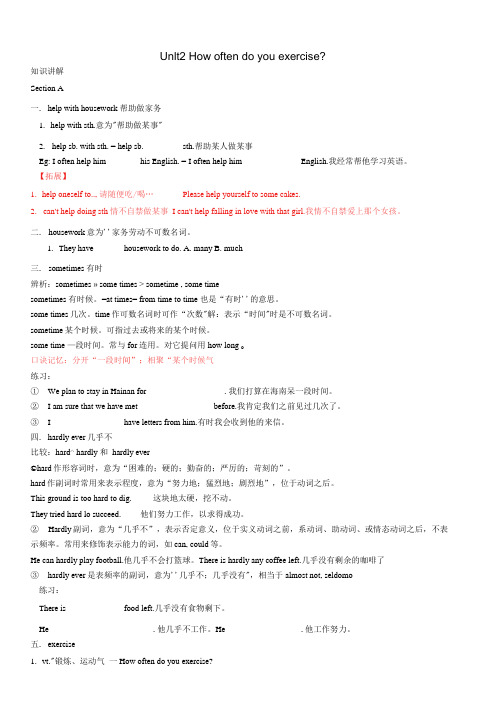
Unlt2 How often do you exercise?知识讲解Section A一. help with housework 帮助做家务1.help with sth.意为"帮助做某事"2.help sb. with sth. = help sb. ________ sth.帮助某人做某事Eg: I often help him _______ his English. = I often help him _____________ English.我经常帮他学习英语。
【拓展】1.help oneself to.., 请随便吃/喝…Please help yourself to some cakes.2.can't help doing sth 情不自禁做某事I can't help falling in love with that girl.我情不自禁爱上那个女孩。
二. housework意为''家务劳动不可数名词。
1.They have ______ housework to do. A. many B. much三. sometimes 有时辨析:sometimes » some times > sometime , some timesometimes 有时候。
=at times= from time to time 也是“有时''的意思。
some times几次。
time作可数名词时可作“次数"解:表示“时间"时是不可数名词。
sometime某个时候。
可指过去或将来的某个时候。
some time —段时间。
常与for连用。
对它提问用how long o口诀记忆:分开“一段时间”;相聚“某个时候气练习:①We plan to stay in Hainan for _________________ .我们打算在海南呆一段时间。
八年级英语上册Unit2Howoftendoyouexercise第3课时教案(新版)人教新目标版

4. 鼓励学生主动参与课堂活动,增加实践机会。
四、教学方法与手段
教学方法:
1. 任务驱动法:通过设计具有实际意义的任务,让学生在完成任务的过程中运用所学知识,提高语言实际运用能力。
2. 情境教学法:创设真实的语言环境,让学生在特定的情境中学习英语,增强学习兴趣和积极性。
5. 编写一个关于你所在城市的交通状况的句子,使用一般现在时态。例如:“Traffic in my city is usually heavy in the morning and evening.”
作业要求:
- 每个句子都要使用一般现在时态。
- 句子内容要真实、有意义,尽量避免使用中文。
- 作业完成后,学生需自行检查语法和拼写错误。
八年级英语上册 Unit 2 How often do you exercise第3课时教案 (新版)人教新目标版
课题:
科目:
班级:
课时:计划1课时
教师:
单位:
一、教学内容
本节课为人教新目标版八年级英语上册Unit 2 How often do you exercise的第三课时。本课时主要内容为Section B 3a-3c。本节课主要让学生掌握一般现在时态的疑问句和回答方式,以及频率副词的运用。通过本节课的学习,学生能够更好地运用一般现在时态描述自己的生活习惯,提高英语口语表达能力。
3. 编写一个关于你家人日常运动的句子,使用一般现在时态。例如:“My mother often does yoga in the evening.”
4. 编写一个关于你同学日常运动的句子,使用一般现在时态。例如:“My classmate never misses the school sports meeting.”
八年级上册Unit2__How_often_do_you_exercise
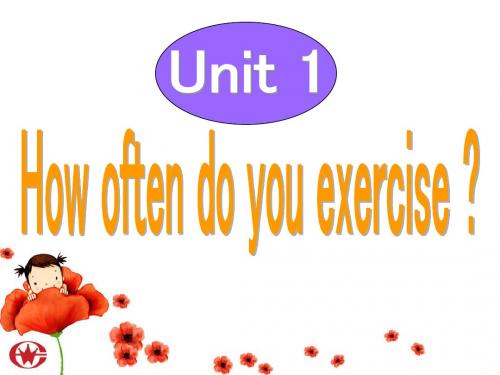
U
;练习
C
1.exercise = do some exercise 进行锻炼
How often do you exercise ?
你通常多久锻炼一次?
2. do morning exercises 做早操
do class-between exercises
做课间操
do eye-exercises 做眼保健操
Cf, I watch TV three times a week. → How often do you watch TV ?
Using always…
Talk about activities
go skateboarding
go skating
go fishing
go swimming
go shopping
How often do you…?
3 5 4 2
Reporter: So Cheng, how often do you watch TV?
Cheng: Cheng: Cheng: Cheng: Cheng:
Hmmmm… about _____________ twice a week , I guess.
hardly ever once a month twice a week three times a month
A: How often do you watch TV ? B: Every day .
A: What‟s your favorite
program?
B: It‟s Animal World .
skateboarding e 1. ___________________
d watching TV 2. ___________________ c exercising 3. ___________________________
八年级上册Unit 2 How often do you exercise 八年级英语
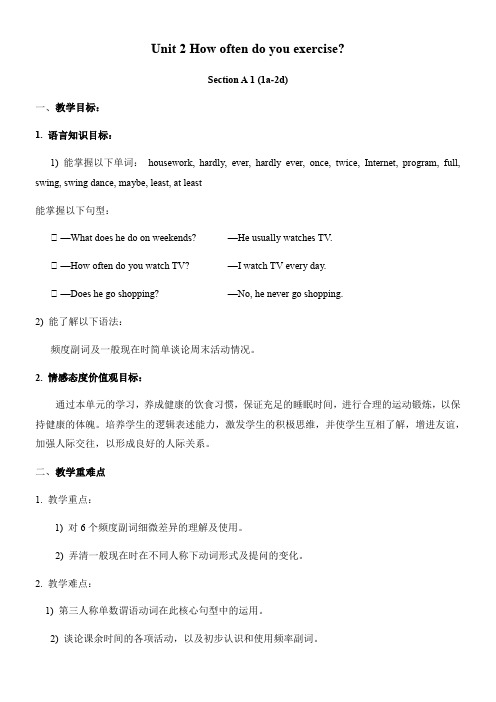
Unit 2 How often do you exercise?Section A 1 (1a-2d)一、教学目标:1. 语言知识目标:1) 能掌握以下单词:housework, hardly, ever, hardly ever, once, twice, Internet, program, full, swing, swing dance, maybe, least, at least能掌握以下句型:① —What does he do on weekends? —He usually watches TV.① —How often do you watch TV? —I watch TV every day.① —Does he go shopping? —No, he never go shopping.2) 能了解以下语法:频度副词及一般现在时简单谈论周末活动情况。
2. 情感态度价值观目标:通过本单元的学习,养成健康的饮食习惯,保证充足的睡眠时间,进行合理的运动锻炼,以保持健康的体魄。
培养学生的逻辑表述能力,激发学生的积极思维,并使学生互相了解,增进友谊,加强人际交往,以形成良好的人际关系。
二、教学重难点1. 教学重点:1) 对6个频度副词细微差异的理解及使用。
2) 弄清一般现在时在不同人称下动词形式及提问的变化。
2. 教学难点:1) 第三人称单数谓语动词在此核心句型中的运用。
2) 谈论课余时间的各项活动,以及初步认识和使用频率副词。
三、教学过程Ⅰ. Warming upTalk about your last weekend’s activities.Ⅱ. Presentation(1) 教师问:“What do you usually do on weekends ? ” (并且板书)让学生根据自己的实际回答I usually …… on weekends.(2) 教师出示动词卡片watch TV,read books,exercise,swim, play football、go shopping、go to movies让学生回答。
八年级英语上册教案 Unit 2 How often do you exercise
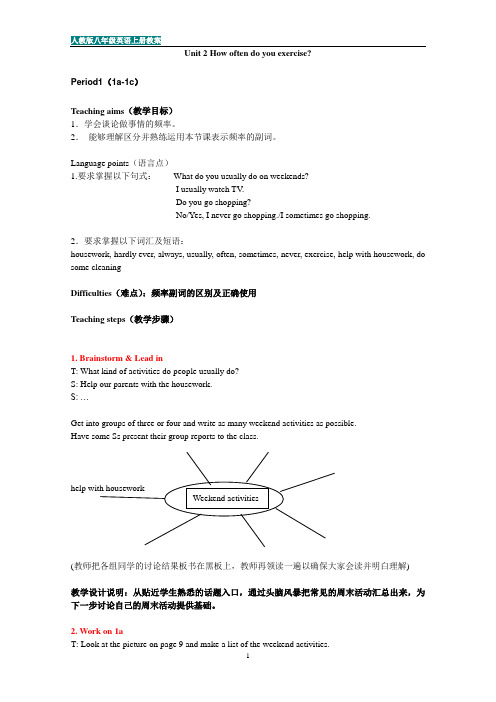
Unit 2 How often do you exercise?Period1(1a-1c)Teaching aims(教学目标)1.学会谈论做事情的频率。
2.能够理解区分并熟练运用本节课表示频率的副词。
Language points(语言点)1.要求掌握以下句式:What do you usually do on weekends?I usually watch TV.Do you go shopping?No/Yes, I never go shopping./I sometimes go shopping.2.要求掌握以下词汇及短语:housework, hardly ever, always, usually, often, sometimes, never, exercise, help with housework, do some cleaningDifficulties(难点):频率副词的区别及正确使用Teaching steps(教学步骤)1. Brainstorm & Lead inT: What kind of activities do people usually do?S: Help our parents with the housework.S: …Get into groups of three or four and write as many weekend activities as possible.Have some Ss present their group reports to the class.(教师把各组同学的讨论结果板书在黑板上,教师再领读一遍以确保大家会读并明白理解)教学设计说明:从贴近学生熟悉的话题入口,通过头脑风暴把常见的周末活动汇总出来,为下一步讨论自己的周末活动提供基础。
2. Work on 1aT: Look at the picture on page 9 and make a list of the weekend activities.Go through the answers together as a class.1.help with housework2. watch TV3. go shopping4. do some reading/read5. exercise教学设计说明:有了课前的讨论导入,这些有关周末的短语已经基本复习了,所以这一步对于学生来说很简单,所以直接和学生一起对答案就可以了。
八年级上册英语Unit_2_How_often_do_you_exercise知识点总结

Unit 1 How often do you exercise?【知识梳理】I. 重点短语 1. go to the movies=go to the cinema 看电影2. look after=take care of 照顾3. surf the Internet 上网4. healthy lifestyle 健康的生活方式5. go skateboarding 去划板6. (be) in good health =(be)healthy 身体健康7. keep healthy=keep in good health 保持健康8. as for 至于9. take/do exercise=play/ do sports 锻炼,做运动10. eating habits 饮食习惯11. the same as 与……相同12. once a month 一月一次13. be different from 不同14. twice a week 一周两次15. make a difference to 对什么有影响16. how often 多久一次17. although=though 虽然18. most of the students=most students 大多数学生19. activity survey 活动调查20. go shopping=do some shopping 购物21. do homework 做家庭作业22. do housework 做家务事23. junk food 垃圾食物24. be good/bad for 对……有益(害)25. on/at weekends 在周末26. want to do sth=would like to do sth =feel like doing sth 想要做某事27. want sb to do sth = would like sb to do sth 想要某人做某事28. try to do sth 尽量做某事try doing sth. 试着做某try one‟s best to do sth. 尽力做某事29. come home from school 放学回家30. of course=certainly=sure 当然31. get good grades 取得好成绩32. help sb (to)do sth 帮助某人做某事,33. help sb with sth 在某方面帮助某人34. a lot of =lots of=many /much 许多,大量的35.as for 至于;关于36.how many 多少(针对可数名词)37.how much 多少(针对不可数名词)38.of course = sure 当然;确信39.every day 每一天40.every night 每晚41.hardly ever 几乎不42.be good for one's health 有益健康43.try to do sth. 尝试做某事44.kind of 有点II. 重要句型 1 How often do you exercise? 你多久锻炼一次?2 Three to six times a week 每周三到六次3 How long do you sleep every night? 你每天睡几个小时?4.I sleep more than 5 hours every night 多于5小时5. How often do you eat fruit and vegetables? 你多久吃一次水果和蔬菜?6.What do you usually do on weekends?你周末通常做什么?7.I usually play soccer 我通常踢足球8.What is your favorite program?你最喜欢的节目是什么?9.Some students are very active,they exercise every day一些学生非常的活泼,每天都运动.10.As for homework,most students do it every day关于作业,大多数学生每天都做.III. 交际用语询问别人做某事的频繁程度IV. 重要语法频率副词一For about three years.大约三年.(2)how soon意为“多久以后”.多用于将来时间,其答语为in+一段时间.—How soon will your mother come back?你妈妈多久以后回来?一She will be back in ten minutes.她十分钟以后回来.(3)how many times意为“多少次”,它只询问次数,即“多少次”.常用once一次,twice两次,three times三次等回答.一How many times did you get to Beijing?你去北京几次了?—Oh,four times.哦,四次了.(4)how far意为“离……多远”,多用来询问路程.How far is it from your school to your home?你家距离学校有多远?【易混辨析】house, family ,home(1)house一般指所居住的建筑物,即“房子,住宅”.His house was burned in a big fire.他的房子在一场大火中被烧毁了.(2)family着重指家庭成员.My family are au here.我们一家都在这儿.(3)home则指某人出生及生活的环境,包括住处及家人.He left home at the age of 18.他18岁离开了家.4.trytry to do sth.试图做某事,想要做某事try one's best竭尽所能She tries to learn English.她试着去学英语.Jack tries his best to win the game.杰克尽他最大的努力去赢这场比赛.5. a lot of, many, much三者都可表示“许多”,a 10t 0f既可修饰可数名词,也可修饰不可数名词;many修饰可数名词复数;much 修饰不可数名词.We have a lot of friends.---We have many friends.我们有许多朋友.Do you have a lot of money?=Do you have much money?你有许多钱吗?在修饰可数名词复数时,a lot/lots of可与many互换;在修饰不可数名词时,alot/lots of可与much互换.但a lot/lots of一般不用于否定句和疑问句中,在这两类句子中要用many或much.6.kind ofkind of后接形容词或副词,意为“有点,有几分”.He felt kind of tired.他感觉有点累.The like is kind of expensive.那辆自行车有点贵.(1)a kind of+ m一种This kind of question is hard to answer.这种问题很难回答.(2)all kinds《+n.各种各样的There are all kinds of flowers iIl the park.公园里有各种各样的花.(3)different kinds of+n.不同种类的There a地different kinds of animals in the zoo.动物园里有不同种类的动物.7.Maybe ,perhaps, likely possible, probablymaybe. perhaps和probably都有“也许,大概”的意思.perhaps也许,大体和possibly同义;probably大概,肯定的成分较大,是most likely的意思;possibly可能,常和call,may,must等情态动词连用,比probably语气弱得多;maybe或许,比perhaps普通,但不庄重;likely或许,通常与most,very连用.8.although , thoughalthough和though作连词用,意为“尽管,虽然”,二者可以通用.Although/Though they are so poor ,they have enough to eat·他们虽然穷,食物还是够吃的.注意:在一个句子中,用了although或though就不能用but了,用了but则不能用although或though,即:“虽然……但是……”不见面,但是可以用yet.9.hard, hardlyhard既可作形容词,也可作副词,其词义丰富;hardly是具有“几乎没有,几乎不”这种否定含义的独立副词. ms ground is too bard to dig.这块地太硬,挖不动.(adj.)Chinese is hard t0 learn for foreigners.对于外国人来说汉语很难学.(adj.)You should study hard.你应该努力学习.(adv.)There is hardly any coffee left.几乎没剩下什么咖啡了.(adv.)Hardly anybody came.几乎没有什么人来. (adv.)【中考连线】①一Do you have any plans for your summer vacation?一I am ____for London next Sunday.A.going to B.leaving C. will go答案:B点拨:leave for意为“动身去某地”,故选B.②(2009·浙江湖州中考)---___do you visit your uncle?----Once a week, at least.A.How long B.How manyC.How often D .How soon答案:C点拨:本题考查疑问词的用法.由答语“至少一周一次”可知用how often how long “多久”;how m any'…多少”;how soon'…多久”.③(2009·淄博中考)--Would you mind ____my little sister while I‟II away?--Of course not.A.looking for B. looking atC. looking afterD. looking forward to答案:C点拨:由题意“当我不在时,你介意照顾一下我妹妹吗?”知选looking after.④《2009·河北中考)--___can you be ready ,Andy?一In ten minutes. .A.How much B.How oftenC.How long D .How soon答案:D点拨:how much多少.提问不可数名词或价格;How often多久一次;how long多久,多长;how soon多久,用于将来时态.由答语in ten minutes“在l0分钟之后”知选D.1. How often do you shop? 疑问词how的用法(1)怎样,用什么手段,方法/交通工具How are you? / How is she?How did he do it? / I don‟t know how to swim.How do you come to school?(2) 情况如何(指身体健康状况)How are you?(3) how many,how much表示“多少”how many后接可数名词复数,how much接不可数名词。
八年级英语上册 Unit 2 How often do you exercise?(第1课时)说课稿

八年级英语上册 Unit 2 How often do you exercise?(第1课时)说课稿一. 教材分析八年级英语上册Unit 2 How often do you exercise?主要讨论了人们日常的锻炼习惯。
本节课的主要内容是掌握频率副词,学会用一般现在时询问和回答别人锻炼的习惯,并能够用一般现在时描述自己的锻炼习惯。
教材通过丰富的语境和真实的场景,让学生在实际情境中学习和使用英语,提高学生的语言运用能力。
二. 学情分析八年级的学生已经掌握了基本的英语语法和词汇,具备一定的听说读写能力。
但是,学生在使用英语进行实际交流时,还存在着一定的困难,特别是在描述日常生活习惯方面。
因此,教师需要通过创设真实情境,让学生在实际交流中提高自己的英语水平。
三. 说教学目标1.知识目标:学生能够掌握频率副词,学会用一般现在时询问和回答别人锻炼的习惯,并能够用一般现在时描述自己的锻炼习惯。
2.能力目标:学生能够在真实情境中运用所学知识进行交流,提高自己的语言运用能力。
3.情感目标:培养学生热爱生活,注重锻炼的良好习惯。
四. 说教学重难点1.重点:频率副词的运用,一般现在时的疑问句和回答句的构成。
2.难点:如何正确运用频率副词和一般现在时描述自己的锻炼习惯。
五. 说教学方法与手段1.采用任务型教学法,通过设定真实情境,让学生在完成任务的的过程中,学习和运用所学知识。
2.利用多媒体教学手段,如图片、视频等,为学生提供丰富的视觉和听觉信息,激发学生的学习兴趣。
3.分组讨论法,让学生在小组内互相交流,提高学生的合作能力和语言运用能力。
六. 说教学过程1.导入:通过提问学生日常生活中喜欢的运动,引出本节课的主题。
2.新课呈现:通过展示图片和视频,引入频率副词和一般现在时的概念。
3.课堂讲解:讲解频率副词的用法,一般现在时的疑问句和回答句的构成。
4.实践环节:学生分组讨论,用英语描述自己的锻炼习惯,教师巡回指导。
八年级英语上册 Unit 2 How often do you exercise Section A

第2单元 How often do you exercise?Section A 单词housework n.家务劳动;家务事hardly adv.几乎不;几乎没有ever adv.在任何时候;从来;曾经once adv.一次;曾经twice adv.两次;两倍Internet n.(国际)互联网;因特网program n.(=programme)节目full adj.忙的;满的;充满的swing n.摆动;秋千v.(使)摆动;摇摆maybe adv.大概;或许;可能least adv.最小;最少adj.& pron.最小的;最少的短语hardly ever几乎从不help with housework帮忙做家务on weekends在周末how often多久一次go shopping去购物once a week每周一次twice a month每月两次go to the movies去看电影be free有空every day每天use the Internet用互联网swing dance摇摆舞play tennis打网球at least至少;不少于句型1.—What do you usually do on weekends? 你周末通常做什么?—I always exercise. 我总是锻炼。
2.—How often do you go to the movies? 你多久看一次电影?—I go to the movies maybe once a month. 我大概每月去看一次电影。
Section B 单词health n.健康;人的身体(或精神)状态result n.结果;后果percent n.百分之……online adj.& adv.在线(的);联网(的)television n.电视节目;电视机although conj.虽然;尽管;即使through prep.以;凭借;穿过mind n.头脑;心智such adj.& pron.这样的;那样的;类似的together adv.在一起;共同die v.消失;灭亡;死亡writer n.作者;作家magazine n.杂志;期刊however adv.然而;不过almost adv.几乎;差不多none pron.没有一个;毫无junk n.无用的东西;无价值的东西than prep.& conj.(用以引出比较的第二部分)比less adv.较少;较小adj.& pron.较少的;更少的point n.得分;点v.指,指向短语junk food垃圾食品such as 例如;像……这样more than多于less than少于the answers to ……的答案good/bad habits 好/坏习惯句型1.She says it 's good for my health. 她说它对我的身体有好处。
